#obviously this is opinion
Text
ENG PLAYERS I BESEECH YOU
I have been informed that you guys are getting part 4 of episode 7 tomorrow, which means we are FINALLY going to get the official romanization of Revaan's name, somebody please tell me because I need to know what it is.
like, yes, it's probably just Revan/Levan, but look, I'm sitting here with my finger over the button of all these Laverne and Shirley jokes and just waiting for the opportunity to deploy them --
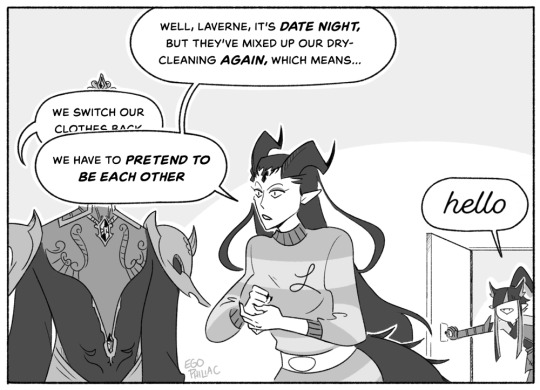
#art#twisted wonderland#twisted wonderland spoilers#twisted wonderland episode 7 spoilers#twisted wonderland book 7 spoilers#twisted wonderland episode 7 part 5 spoilers#twisted wonderland book 7 part 5 spoilers#(not me realizing that meleanor doesn't actually appear non-silhouetted until part 5 so uhhhhh. whoops.)#(i know a bunch of you read the spoiler-tagged stuff though so i'm putting my life in your hands)#revan would be the funniest one i think because it's just raven but with the vowels switched and i'd be over here going WHAT COULD IT MEAN#anyway i'm here to give the people what they crave and it's obviously references to 70s american sitcoms that spun off of happy days#mork and grimdy. i-is that anything.#the problem of course is now that i might have to actually come up with a bunch of laverne and shirley jokes#when i haven't...actually watched it in a million years#(my personal pool of media i consumed growing up is a good 60% made up of random things i found to watch at 3 am because of insomnia)#(this probably explains a lot about me) (the opinions about zorro adaptations anyway)#hold on let me marathon all eight seasons and -- wait i'm just now finding out there was also an animated series#in which they joined the army and their sergeant was a literal cartoon pig but also they went to space and fought giant gorillas?#but how does boo boo kitty factor into this
2K notes
·
View notes
Text



2023 Met Gala Attendees who weren't Basic Bitches
Brian Tyree Henry, Dua Lipa, Michaela Coel, Jared Leto, Anok Yai, Jenna Ortega, Lil Nas X, Alton Mason, Shai Gilgeous Alexander, Janelle Monae, Doja Cat, Teyana Taylor, Sora Choi, Lady Gaga, Conan Gray, Cardi B, Yung Miami, Harvey Guillen.
#met gala#met gala 2023#harvey guillen#janelle monae#anok yai#fashion#teyana taylor#brian tyree henry#yung miami#sora choi#celebrities#This is obviously personal opinion on the outfits not the people#Mine
3K notes
·
View notes
Text



bbc merlin - 03x08 The Eye of the Phoenix
the guy who can barely get the words "we're friends" past his lips vs the guy who will call you his best friend within the first day of you meeting aka the different representations of love and affection in bbc merlin
#merlin rewatch#bbc merlin#03x08#merlin#gwaine#arthur#merwainthur#?#s3#i dont want to see anyone tagging this as 'arthur doesn't care'#obviously you're entitled to your own opinions#but this is just inward and outward affection#they were both equally worried in the scene just before this
543 notes
·
View notes
Text
My hot take: Nintendo constantly mischaracterized Mario in the early 2000s just so they could tell jokes at Luigi's expense. I've been playing the remake of TTYD recently and this phenomenon is ESPECIALLY noticeable in that game.
Like, I'm sorry Intelligent Systems, but Mario would not fall asleep listening to Luigi recount his own journey in the Waffle Kingdom. That motherfucker would be on the edge of his SEAT listening to his brother talk about the adventure he'd been on. He'd be so proud of him!
Likewise, Mario wouldn't just stand around and purposefully choose to do nothing if Luigi was being yelled at and antagonized by a toad. That's INCREDIBLY ooc for Mario to do, and the bit of poking fun at Luigi to an almost cruel degree was never funny in the first place tbh.
#ttyd#super mario#mario#the thousand year door#luigi#paper mario#pmttyd#drabbles#obviously this is just my opinion but i have a feeling theres at least SOMEONE who agrees with me#mario would not act like that???
288 notes
·
View notes
Text
Anyways i also think that Chuuya SHOULD NOT be the Port Mafia boss to be totally honest witchu. If his entire experience with the Sheep, and the way he cracked under pressure as the interim leader during cannibalism, and like, THE BEAST EPILOGUE, had anything to say it's that Chuuya's not fit to be the leader of an organization such as that.
Bc Chuuya's good at adapting, he's good at spur of the moment decisions. He's good with battle tactics. We see his actual leadership abilities shine when he's commanding the mafia troops to protect the city during the guild arc. In cannibalism, his plan to rush the ADA with a full frontal attack was a SOLID idea. But he loses his advantage as soon as he hesitates and opens the table for negotiation instead.
BECAUSE Chuuya's not good at playing the long game like Mori or Dazai. He's reactionary and it's his nature to get overwhelmed by his emotions. He takes on too much responsibility but loses focus due to personal reasons. That what happens in 15 where he blows off the Sheep to go on a life changing field trip with Dazai. That's why he was taken out of the picture so easily to go on a life changing field trip with Ranpo in Cannibalism. (Damn maybe this is why he's on a life changing field trip with Fyodor as a vampire currently).
Essentially even though Asagiri has been really tying Chuuya's character with the themes of leadership, we've mostly been shown why he wouldn't be a good fit. Either this plot point will trend towards Chuuya actually learning how to be a good leader OR he won't end up as one. IN ANY CASE what we know abt Chuuya makes me really think that being the Port Mafia's boss is a terrible idea. He's not fit for the role and frankly, I think he'd hate it.
#another interesting thing: kunikida and chuuya are obviously made to be foils.#and the two of them are currently set up to be the next leaders of their respective organization BUT#were consistently shown that when they ARE in that position they can't handle the pressure#they both crack under stress. they both act self sacrificial.#Kunikida is agreed by everyone to be the agency's next president but tbh i think that's also a TERRIBLE IDEA.#kunikida forces himself to fit a standard. making him the agency's president is only doubling down on a damaging self opinion i think#and honestly i think ranpo would be a good fit for the next leader tbh. thats another story#bsd#meta i guess?#i might expand on the kunikida thing later#ALSO wtf does chuuya DO as an executive?? WHATS HIS ROLE???
2K notes
·
View notes
Text
CLASSES - a comprehensive guide
The first thing that needs to be said is that there is no such thing as a "bad" class. All of them have the potential to be a great detriment OR great boon to the rest of the team, depending on how far along the journey of self-actualization a party member is. Some may have steeper challenges, but this corresponds with greater rewards.
The second thing that needs to be said is that all players are part of a team, and all personal journeys and playstyles are interlinked. No class is truly "solo." Even the smallest viable session is still two people, and even the most suitable classes for solo play are stronger when they're in a party.
The last thing that needs to be said is that the game wants you to succeed. The game, inherently, wants every player to reach godhood, wants every player to self-actualize, wants every player to win. It respects free will and free choice, so it will allow for failures (and, indeed, doomed timelines are vital to the alpha one existing), but Skaia is ultimately optimistic, and tries at every turn to ensure that a golden ending is possible.
Because, after all, SBURB/SGRUB - and Homestuck itself - are about children growing up, maturing, and learning compassion for each other. About fixing their flaws and rejecting the negative aspects of the society they came from. It's about how it is our duty, our responsibility, to become kind, mature people who care about one another, because we will one day be responsible for creating a new society.
And so, without further ado:
ACTIVE (-) Classes and PASSIVE (+) Classes are described with the dichotomy of "powers working for the self" vs. "powers working for others," but I believe this to be an oversimplification of what the active and passive split is. Both active AND passive classes benefit from being in a party; however, an active class will gain fewer party benefits in exchange for being more suited for solo play, while a passive class will be less suited for solo play, but confer much greater benefits to party play.
This is reflected in their personal quests: while active classes and passive classes will both require intervention, empathy, and guidance from their teammates, the struggle of an active class is usually one of grappling with internal flaws, and the struggle of a passive class is one of grappling with interpersonal or societal relations. In other words, the personal quest of an active player will usually involve getting therapized, while the personal quest of a passive player will usually involve addressing a systemic societal issue. Often, both will be required, but whether a class is active or passive will indicate an area of focus.
KNIGHT - / MAID +
PARTY MANAGEMENT
one who wields [aspect] or leads with [aspect] / one who distributes [aspect] or manages with [aspect]
KNIGHTS (-) are a very flexible and versatile class; "wielding" their aspect does not necessarily mean they are skilled at DPS. It actually indicates the way a knight interacts with their aspect, a very straightforward relationship of tradesperson and tool, or soldier and weapon. Similarly, while a knight does not always take up the "leader" position in the party, they will be the "spearhead," a point behind which the other players rally, a beating heart keeping the party together.
This straightforward relationship between a knight and their aspect leads to knights finding little difficulty mastering their aspect once they've begun. Many knights are, in fact, instinctively drawn toward utilizing their aspect, in the same way that they are naturally drawn toward roles of importance or heroism.
Knights often struggle with their perceived place in society, as well as with their innate sense of self and self-worth, seeing themselves as outcasts, resenting the responsibility placed on their shoulders, and fearing vulnerability. Unaddressed, these issues will lead to knights who actively become a detriment to party success. For example, they can dismiss valid concerns, shirk their duties, and in the worst case scenario, actively lead the party down the wrong path, invoking their natural ability to lead for ill.
Therefore, a knight's journey is one of accepting themselves and accepting their duty to better the world. It is about coming to terms with their own insecurities and learning to rely on others. It is about learning to take responsibility, and accepting the banner of a just and glorious cause.
A fully realized knight will be the center of every charge, the guiding star behind which the other players rally. They can provide clarity and guidance to those still on their journeys, and peace and comfort to those who are struggling or in pain. Where the knight goes, the party will follow, as a unified and united front.
MAIDS (+), meanwhile, tend to be on the backlines. If the knight is the forward march, then the maid is the supply line, an incredibly vital role whose absence is disastrous, even if its presence is nearly invisible. Maids have a nearly infinite well of their aspect to distribute, and are uniquely talented at managerial duties - keeping players on task, patching up the holes in a plan, sourcing and supplying resources, so on and so forth.
This is not to say that maids are relegated to support roles - a maid is usually capable of holding their own in combat just fine, especially if they've been endowed with a more combat-suited aspect. Both knights and maids are extremely versatile. That being said, maids truly shine when they're able to take on these backline roles, and many maids are more noticeable by the devastating effects of their absence rather than the invisible touch of their presence.
However, they are the class that most often starts in subservient conditions - low status, strict duties enforced upon them, so on - and their personal journey is a constant struggle against the control of others. Maids whose parties fail to grapple with and undo these shackling forces will find their maids succumbing to the influence or control of malicious entities; in the worst-case scenario, a maid can become an actively hostile enemy or saboteur, invisibly pulling the party's strings and setting them up for failure.
Therefore, a maid's journey is about rejecting societal oppression and throwing off the chains that bind them. A successful maid rises to become the head of the household - nothing occurs within the game that does not first pass the maid's inspection, and their touch ensures that there is a place for everything, and everything is in its place.
A free maid, who belongs to themselves, incomparably increases a party's efficiency. Every communication line is clear, every distribution route is clean, every mystery is solvable, and every plan is airtight. A maid guarantees that nothing can ever go too wrong.
PAGE - / HEIR +
TEAM BONDING
one who must earn [aspect] or inherits the mantle of [aspect] / one who is beloved by [aspect] or awakens to [aspect]
PAGES (-) start the game with the fewest benefits from their aspects, but the greatest potential for growth. Theirs is a constant battle with the self; they are often cowardly and naive. They possess sensitive souls, and while it is incredibly easy to hurt a page, it's much more difficult to build them up. Because of the difficulty of raising this class, it's practically defined by its journey - a constant struggle against the self - rather than its destination, and the powers the class confers.
Pages, like heirs, are classes of inheritance. A page is promoted by trials and tribulations and comes to inherit a greater power than they begin with; in the same way, the class will one day come to embody its aspect, although the road will always be turbulent and long. Moreover, it is a journey without end; pages, being as sensitive as they are, are the most prone to backwards progress, even after reaching their peak.
They prone to staying weak throughout the entire game, never self-actualizing past being the party joke. They attract the obsession and ridicule of stronger-willed players, and their mistreatment can become extremely divisive. A page can easily become a party's albatross, the epicenter of massive interpersonal conflicts, which can tank an entire session.
Therefore, a page's journey is one of the most difficult of all - that of teaching others how to care about other people. Pages rely on great patience, kindness, and understanding. Their sensitive souls must be carefully nurtured and propagated with love and attention. In the same way that a page can tear a team apart, they can bring a team together, all in the name of compassion and empathy. A fully-realized page is the symbol of a party that has linked hands with one another.
Self-actualized pages, as a result of the difficulty inherent to the class, are incredibly powerful and versatile when fully realized. Inheriting the mantle of their aspect, they become pure embodiments of their aspect, capable of achieving impossible feats of raw, unfiltered power, and inspiring all those who gaze upon them.
HEIRS (+) begin the game very strong, but have a difficult time becoming stronger. This is because their usage of their aspect is very instinctual to them, even at times being entirely beyond their control, hence, "beloved by" in the class description. However, because of how naturally their aspect comes to them, it makes taking further command of their powers difficult.
An heir "awakens to" their aspect because their natural, intuitive control often renders them too comfortable to grasp the greater implications of their class. As an inheritance class, heirs can come to embody their aspect, transforming entirely into it. Their challenge lies in breaking out of their comfortable shell and learning how to utilize their powers in more active, intentional ways.
This is reflected in their personal quests. They are often set to inherit great privilege or wealth prior to entering the game, and are thus naive to the realities of the suffering and pain of others. Without a supportive party willing to challenge their views, heirs can perpetuate that pain by submitting to their place in the world, becoming a divisive force within the party, or, in the worst case, losing themselves to their inheritance, and submitting so wholly to their aspect that they become lost to the rest of the team.
Thus, an heir's journey is to question the stratification of the society they belong to, so that they can recognize and address its flaws. They must learn to interrogate their inheritance, separate it from themselves, and reconcile with it. Theirs is an arc of examination and understanding, descending from their position of privilege and peace to learn about the suffering of others, and deciding that they wish to do something about it.
With full command over their aspect, and a clear vision for how it ought to be distributed, the party gains a new and powerful ally - the aspect itself, which will come to embrace the entire party as family. A fully-realized heir connects the privileged and underprivileged, spreading their inheritance to all.
MAGE - / SEER +
GUIDANCE
one who invokes [aspect] or is drawn to [aspect] / one who comprehends [aspect] or is guided by [aspect]
MAGES (-) are a class of prophets, although saying they "see the future" is misleading. Rather, mages "invoke" the future, collapsing causality to align to their desires. Most mages remain unaware that they are doing so until well into their journey. While all players weigh on the scale of causality, affecting both past and future events, and which sequence of events is the "alpha" sequence, mages have the most direct effect.
Because of this ability to invoke future events, mages possess powerful buffing/debuffing abilities. Furthermore, as one of the two knowledge classes, a mage usually has a very deep understanding of their aspect, and an intuitive knowledge of how the flow of time and causality function. They are "drawn to" their aspects in this way, instinctively searching out points where their influence can affect the flow of events.
However, with great power comes great cost; the mage class is usually assigned to those who are stricken by tragedies and prone to negativity and self-loathing. Mages often begin the game as a detriment to the party, "prophesying" future events that leave the party - including themselves - at a disadvantage. In the worst case scenario, a mage can invoke certain doom for their party or themselves.
Therefore, it is vital that a mage address their tragedies and be given a chance to heal and grow. The ones most struck by tragedy, theirs is a journey of reclaiming lost joy and rediscovering lost hope. However, the transformation is powerful once completed - as the one who suffers tragedy and loss most intimately, a mage can also come to be one of the most empathetic and compassionate members of the team.
If a mage is uplifted, and capable of believing in a kinder and gentler world, then their ability to invoke the future - and the aspects of their aspect that they are drawn to - become kinder, as well. Pain and suffering still have their place, but the ending will be a happy one. With a fully empowered mage, the future will always be better than what came before.
SEERS (+) see multiple branching paths. A mage determines where a road will be built, but a seer tells you where a road CAN be built. They are also often gifted with knowledge of the game and its mechanics, and are especially uniquely gifted with understanding of their own abilities. In this way, they "comprehend" their aspect.
Seers themselves are not particularly gifted in combat through their classpect alone; however, in exchange, they often play a vital role in steering the party. They are the game's built-in guides, with an intuitive knowledge of the game's victory conditions, as well as an instinctive desire to lead others along their paths. Seers are, therefore, one of the most important classes in the game, when one is present.
However, the ability to see is a burden as well as a gift. Seers find themselves paralyzed by choice, and often doubt their own abilities to choose "correctly." They are prone to becoming mired in what-ifs, and struggle with political or ethical debates with no clear answers. In the worst-case scenario, a seer may feel so cursed by their sight that they self-destruct, and deliberately choose poor or incomprehensible answers, in an attempt to free themselves of their sight.
Thus, a seer's quest is, ironically, to see the world beyond the purview of their aspect. They must come to have a more comprehensive understanding of the world they live in, and what purpose they are trying to achieve, so that they can feel confident in the choices they make. A seer is often blind - their journey, therefore, is that of regaining their vision, by connecting with the world outside their inner sight.
A seer with a clear vision for the future will always know exactly which path to choose. A party with such a seer in it will never be stuck and never be lost. If there exists a path to self-actualization, the seer will know it. And if there exists a path to a breathless and perfect victory, a fully-realized seer will light the way.
THIEF - / ROGUE +
UTILITY
one who steals [aspect] from others or steals with [aspect] / one who steals [aspect] for others or steals from [aspect]
THIEVES (-) are a very difficult class to play. They start out with almost no passive abilities regarding their aspect, and their ability to actively use their aspect is contingent on their ability to first "steal" it from someone else. Thus, they are always playing a game of resource management, and there is always a chance for them to be left helpless after a heist gone wrong.
However, their gimmicky nature allows them to overtake other classes even in that class's specialty, if they can set up the exact right circumstances and manage their resources well. This makes them incredibly versatile, especially when a thief is working together with a party, and thus able to count their party among their potential resources. It takes great cunning to play the thief class well.
However, this also makes the thief a potentially dangerous element to the rest of the party. Thieves are often egotistical and self-serving, willing to see enemies and allies alike as resources and tools. Unaddressed, their reckless, selfish natures will earn their teammates' distrust and enmity. In the worst case scenario, a thief running rampant can severely harm the party, or earn so much ire that the party turns against them.
Thus, their journey is that of realizing that their selfishness and ego are flaws - the classic parable of "money doesn't bring happiness." Beneath their uncaring surface lurks genuine emotional distress; a thief must come to realize that their greed and selfishness is an active detriment not only to the people around them, but their own selves. Only then can they heal from their injured souls.
A thief that has undertaken this journey is one who has realized that they are stronger when they are working with others. Their versatility, creativity, and cunning are incredible assets once harnessed toward the will of the party. No situation will ever be inescapable, no safe uncrackable, and no problem unsolvable - not if the thief has anything to say about it.
ROGUES (+) are similarly difficult to play. Unlike the thieves, rogues do see passive benefits from their aspects. However, their active abilities are much less straightforward, and rogues often struggle with understanding them. A rogue's role is to redistribute wealth - thus, "stealing for the sake of others."
A rogue, being able to steal directly from their aspect, truly shines when given enough time to prepare. If a thief must fly by the seat of their pants, then a rogue is a heist planner - they have an infinite box of tools to pull from, if only they know what tools they'll need for the job. This makes them incomparably versatile, even if not necessarily in the heat of combat.
Rogues take on the mantle of challenging the status quo. They usually begin the game already in opposition to their society, seeking out better alternatives and considering unorthodox options. However, not every party is ready for a rogue's radical ideology, and not every rogue has considered the full consequences of their belief in change; in the worst case scenario, the rogue can become outcasted and disregarded, or cause an upheaval that proves disastrous, rioting for the sake of rioting.
It often requires the help of others for a rogue to understand how to use their powers. In the same way, it requires the party's honest communication and exchange of ideas to help a rogue grasp exactly what form their rebellion ought to take. A rogue knows instinctively that something must change; their journey is learning how they ought to go about it.
Once they do, a rogue - given enough time to prepare and plan - is the ultimate utility player, having the right tool for every possible situation. Their abilities are only magnified in a party setting, as their teammates become variables that unlock new possibilities. A party with a fully-prepped rogue always has a perfect plan, a way to solve any problem that they might face.
WITCH - / SYLPH +
AREA CONTROL
one who manipulates [aspect] or achieves dominion through [aspect] / one who nurtures [aspect] or creates a land of [aspect]
WITCHES (-) carry with them the winds of change. A witch manipulates, changing properties of their aspect and their aspect's effect on others, creating a "territory" over which they rule. They see few passive benefits of their aspects, in exchange for their active abilities being so all-encompassing and overwhelming.
Once their territory has been established, witches make the rules. Their changes can be permanent, temporary, massive, and miniscule. However, a witch "achieves dominion" with their aspect - this means that they must first struggle to create this domain, and it's difficult for their abilities to manifest until they do, often leaving younger witches weak and vulnerable.
Witches have strong feelings for how things should and should not be, but not necessarily grounded ideas for how to implement them, often due to some "outsider" status in society. Unfocused witches become dangerous for the party, as they are easily manipulated; in the worst-case scenario, they can fall in with malicious forces, who can sway a witch's turbulent heart and utilize them as a force for negative change, rather than good.
Thus, a witch's journey is that of interrogating right and wrong. A witch must struggle with morality and ethics, and come to clarify their own beliefs; only then can they know what sort of domain they wish to establish, and what sort of rules they wish to enforce. Once they know their own hearts, they can shake off the insidious whispers of malicious external influence.
As if a reward for their struggles for autonomy and independence, the witch is the one whose will is most imposed on the world that comes after them. Just as an evil witch putrefies the world around them, a fully-realized witch who has decided to use their influence for good can create a near-utopia.
SYLPHS (+) call to mind the images of fey folk who sprout plants where they walk. That is how a sylph "creates a land" of their aspect - merely by existing, the world around them becomes suffused by it. A sylph's mere presence nurtures, grows, and heals their aspect; unlike witches, who manipulate what is already there, sylphs can create something from nothing.
The establishment of their domain comes naturally to them. Those caught within it are on the receiving end of their aspect, whether they want to be or not. In exchange for such powerful passive abilities, a sylph's active abilities are weaker, and usually unsuited for solo combat, generally being of healing, buffing, or debuffing nature.
A sylph is prone to selfishness - to luxuriating within their own land, their own aspect, their own mind. They often have difficulty connecting with others and understanding why their own personal world may not be to the liking of the world outside of themselves. Often, they are aloof. An unrealized sylph can cause great harm to the world around them, their domain choking out and smothering their party; in the worst case, they can mire their party within it, leaving their party unable to proceed.
Thus, it often requires the outside world to breach their safe haven in order for a sylph to grow. They must be made uncomfortable, and then made to accept that uncomfortable things are also important - maybe even more important than comfort, at times. Growth often requires pruning; a sylph's journey is to come to understand that good intentions may lead to harm, and, vice versa, that harm can often lead to true growth.
Sylphs can provide the greatest compassion and emotional comfort within a party, encouraging - if not enabling - their teammates' growth in their personal journeys. Once a sylph understands when it is appropriate to encourage, and when it is appropriate to pull back, there is no refuge safer for the party than the sylph's domain.
PRINCE - / BARD +
OBSTACLE REMOVAL
one who destroys [aspect] or destroys with [aspect] / one who allows the destruction of [aspect] or allows destruction through [aspect]
PRINCES (-) possess the ability to annihilate, a destructive class not limited to physical or tangible objects. Princes also enjoy auxiliary benefits as befits their royal titles - many princes start the game with great talents, great status and wealth, or both. They are also endowed with royal presence; their very existence provokes strong emotions from those around them, for good or for ill.
One of the more straightforward classes in the game, a prince's ability to destroy most commonly manifests as DPS. However, their abilities encompass a greater scope than mere damage - the prince's ability to annihilate figurative or metaphysical concepts makes them capable of directly removing any obstacles that stand in their way. As if hungry to consume their aspect, they are naturally drawn towards where it congregates.
However, with great power comes great responsibility: princes are often the most psychologically maligned within the party, and their destructive talents can very easily become self-destructive instead. Usually the result of societal pressure, trauma, and suffering, a prince is prone to embodying the lack of their aspect, rather than its presence. In the worst-case scenario, a prince spreads this misfortune to the rest of their party, destroying the presence of their aspect from their session altogether, often taking themselves along with it.
A prince must be shown compassion. Though they are often viscerally unpleasant to engage with, turning a blind eye to foolishness, loneliness, and suffering - which a prince embodies - is one of the worst things that a party can do. Though the effort at times seems undeserved, to heal a prince requires a staunch belief that there is good to be gained if we are kind to each other. This kindness will be returned; once you are counted among a prince's "people," they will do anything to keep harm from befalling you.
A prince, once shown this grace, is incomparably powerful. To destroy their aspect or with their aspect is the ability to destroy nearly anything, including concepts such as despair, death, and doom. As if proclaiming a royal decree, a fully-realized prince can banish misfortune and ill tidings altogether, leaving nothing standing in the party's way.
BARDS (+) are a wildcard of a class, often responsible for a party's improbable victory, abject defeat, or both. Their abilities are not very well-understood, even by the bard themselves, and they often utilize both passive and active abilities intuitively, unaware that they are doing so. The morale of the party is deeply tied to the bard's own, and it's unclear which side is cause and which is effect.
The ability to allow the destruction of their aspect, or invite it through their aspect, is actually something of a debuff rather than DPS - the bard's ability is to break unbreakable shields, tear down unclimbable walls, and nullify unstoppable forces. Rather than dealing damage themselves, they allow for damage to be dealt that would otherwise have no effect - in other words, by nature, they make the impossible possible. This is the true source of their ability to evoke "miraculous" situations.
Bards are inextricably tied to society - after all, their tales only hold as much value as their relevance to the audience. This means those with the bard class are invariably molded by the worst aspects of the society they come from. They serve as living embodiments of the most unpleasant aspects of society, and living reminders that leaving these elements to fester only means they will multiply in severity. If these beliefs are allowed to go unexamined, bards will always steer a party towards ruin.
Therefore, a party must engage with the bard earnestly, compassionately, and openly, and help them see the errors of the past. A bard must be led, with gentle guidance and genuine openness, to discard their harmful beliefs, and sing a new, more beautiful tune.
A bard that has been brought back into the fold is a worker of miracles. When every other possible option has been exhausted - the knight and maid in disarray, the page and heir unable to keep the party together, the mage and seer blinded, the thief and rogue out of action, the witch and sylph with their territory lost, the prince no longer able to function - this is where a bard will step in, transmuting abject defeat into a perfect and breathless victory.
#homestuck#classpect#classpects#just my own opinions obviously#feel free to disagree#this is also more meant to examine the actual text of homestuck or serve as a reference for fanworks#i dont actually vibe that much with classpecting actual real people#because unlike fictional characters we contain multitudes#still i cant STOP you if thats what you want to do hahahah
435 notes
·
View notes
Text
One of my recent Jason posts has people talking about how valid a writers portrayal of a character is if that writer hates that character which is an interesting conversation specifically when it comes to Jason bc in case you didn't know a lot of writers do not like Jason but also a good few of the writers who hate Jason have also written some of his better stories
Basically what I'm saying is someone should make an alignment chart with one line being how much a writer loves or hates jason and the other line being how good the writer is at writing Jason
#dc#batman#dc comics#jason todd#red hood#also you know#this would cause drama#but yeah bc obviously you have your morrisons who hate jason and right Jason like shit#on the opposite end you have winnick who loves jason and writes him well#then lobdell who loves jason and yet still commits character assassination any chance he gets#and then Stirling who was trying really hard to get people to hate jason but still made him enduring#but thats just my opinion
569 notes
·
View notes
Text




so i finally watched that new special...
#gabriel agreste#hesperia#betterfly#miraculous ladybug#miraculous#hawkmoth#ml paris special#miraculous special#jichanart#yeah this special felt VERY targeted (in a good way)#like obviously i have Opinions but overall very very good gabriel content i enjoyed it a lot
463 notes
·
View notes
Text
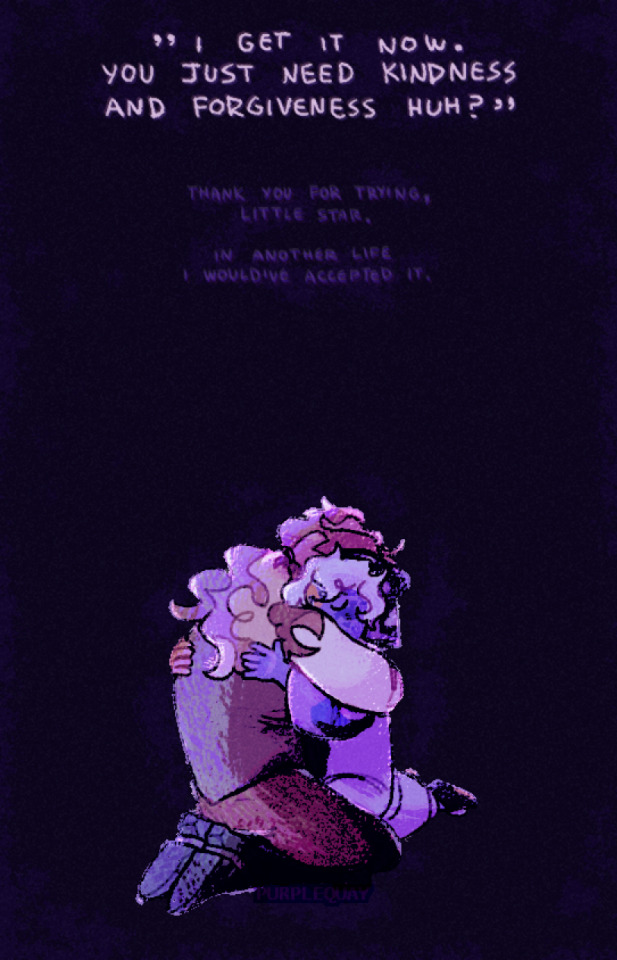
wren's lullaby - dandelion hands // personal slash self indulgent piece
#💉heretic's art#vent art#the owl house#toh emperor belos#toh collector#toh s3 spoilers#<- technically ?#idk who needs to hear this but this is very obviously not supposed to be connected to the canon show or my opinions abt the finale#this is just for ME and caters to ME only <3
1K notes
·
View notes
Text
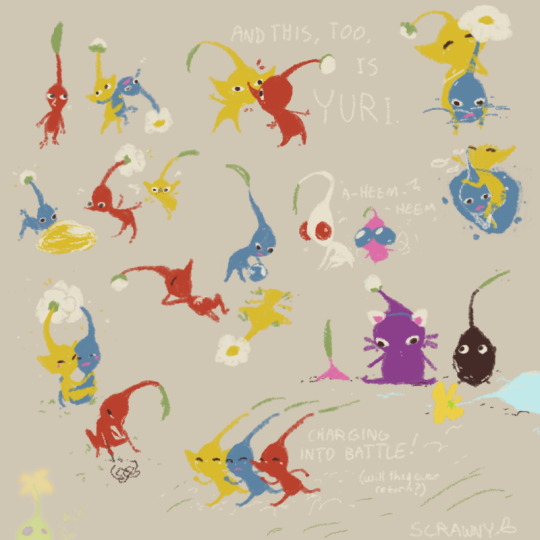
some picked-mins i doodled, alone in a server vc :}
#pikmin#scrawny draws#fan art#red pikmin#yellow pikmin#blue pikmin#purple pikmin#white pikmin#rock pikmin#pink pikmin#ice pikmin#ghost pikmin#plant ant yuri !#obviously the pikmin are genderless and assigning any such sentiments is very silly#but as pikmin take heavy inspiration from ants and all worker ants are (mostly sterile) females i think the goofery lands <3#side tangent but honestly in an anthropomorphised ant society the thing that would serve them the way gender svers us would be *caste*#different morphs allowing for different biologically-assigned roles#that are honestly WAY more distinct than cis perisex human men and women ??? you best believe it#also potentially niche opinion for a fandom i've been in for two whole weeks#but pikmin colours are giving me caste more than they are subspecies#the pikmin cooperate and the onions fuse with ease they balance each other out (ideally) it's so very smooth#there's your tag tangent ok now enjoy the pikffections on display <333#and the icecaine.
597 notes
·
View notes
Text
my abecedarians. my booboo bears. i beseech y'all for those scholarly article websites. my uni databases keep giving me results for articles that aren't available and, like a pirate with a helm on his crotch might say, it's driving me nuts
ABCDEFGHI KLMNOP RSTUVW Y
22/26
#and per se and#i'm trying to write a bitsy baby undergrad paper#on the process of book challenging/banning and the differences between the current surge & the past#notably not being argumentative. obviously i have opinions but that's not the point of the paper#ala.org and court documents give me all i really need. hashtag based humanities.#but i need three Scholarly Sources (i.e. peer reviewed)
333 notes
·
View notes
Text
I love that Elizabeth and Darcy are so ready to effectively tell each other they're full of shit. This happens a bunch of times, but I was re-reading their conversation at the Netherfield Ball and they're both kind of refreshingly Done.
[Darcy:] “Do you talk by rule, then, while you are dancing?”
[Elizabeth:] “Sometimes. One must speak a little, you know. It would look odd to be entirely silent for half an hour together; and yet, for the advantage of some, conversation ought to be so arranged as that they may have the trouble of saying as little as possible.”
[Darcy:] “Are you consulting your own feelings in the present case, or do you imagine that you are gratifying mine?”
“Both,” replied Elizabeth archly; “for I have always seen a great similarity in the turn of our minds. We are each of an unsocial, taciturn disposition, unwilling to speak, unless we expect to say something that will amaze the whole room, and be handed down to posterity with all the éclat of a proverb.”
“This is no very striking resemblance of your own character, I am sure,” said he.
It's also pretty funny, because I suspect Darcy is thinking of this sort of thing in a later conversation at Rosings:
“You mean to frighten me, Mr Darcy, by coming in all this state to hear me. But I will not be alarmed, though your sister does play so well. There is a stubbornness about me that never can bear to be frightened at the will of others. My courage always rises with every attempt to intimidate me.”
“I shall not say that you are mistaken,” he replied, “because you could not really believe me to entertain any design of alarming you; and I have had the pleasure of your acquaintance long enough to know, that you find great enjoyment in occasionally professing opinions which, in fact, are not your own.”
#i love elizabeth cloaking what is obviously a specific personal insult in ostensible solidarity that is in fact the opposite of solidarity#but also that darcy completely sees through it and just says so (then and implicitly later on)#and later in the netherfield ball conversation#darcy actively warns her that she shouldn't form her opinion on him bc at the moment it won't reflect well on either of them#which he is completely correct about—yet he doesn't connect this w/ his assumptions about her encouraging him at all#then or later!#also i appreciate that no matter how many times they challenge each other through social mechanisms#it just never breaks through their mutual arrogance lmao#but it builds until they reach the point where they just drop the bullshit altogether and say exactly what they think and believe#and doing /that/ with each other is what catapults the other one onto their respective character arcs#(w/ the hunsford scene and darcy's letter)#anghraine babbles#long post#austen blogging#fitzwilliam darcy#elizabeth bennet#otp of otps#pride and prejudice#jane austen
306 notes
·
View notes
Text
and just like clockwork twitter and tiktok “swifties” are already doing the 2 things they always do when a new re-recording comes out
1. “she didn’t breathe the same here in (any song) i’m just going to stream the stolen 😡😡”
2. “there’s no way she wrote (any vault track) back in (insert year) she has to have written them post midnights and is lying 🙄”
it literally was never about “improving” or “botching” the album it’s about her owning her work hasn’t she made it clear enough…?
#.txt#taylor swift#rant#except this time a certain fandom is (once again) joining the hate and going back to classic old slutshaming#and obviously each one has their opinion but i think that what matters is to support her initiative of owning her art#which is the reason this whole process started in the first place#i mean do you think she WANTED to make all those albums again if they had not been stolen from her?
426 notes
·
View notes
Text
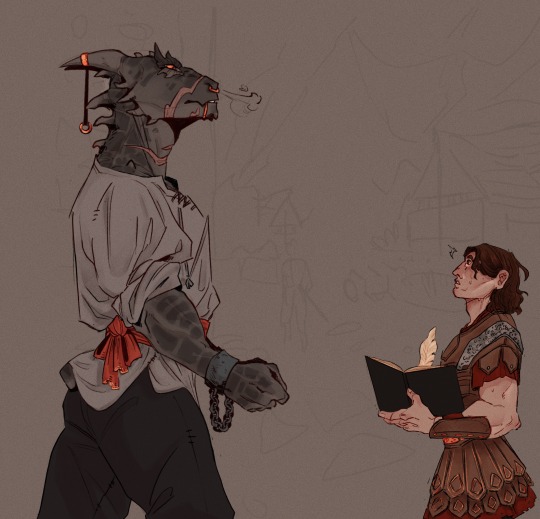
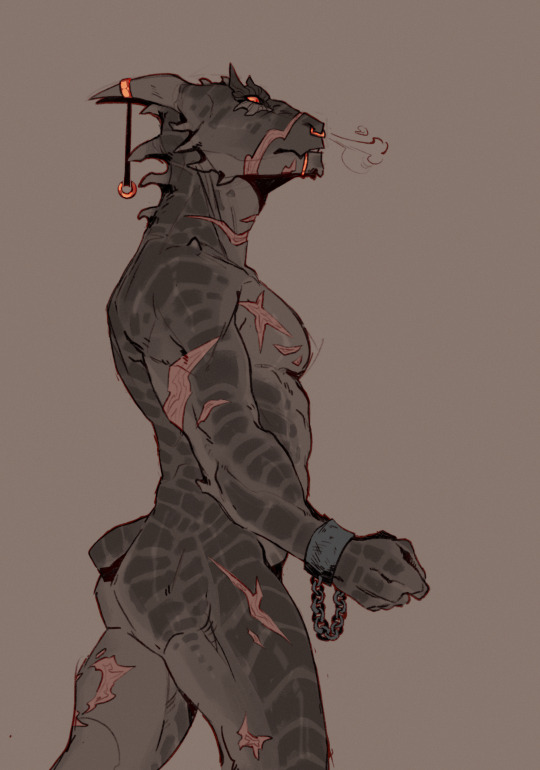
Guys wait- wait guys- guys- guYS
….. I got a bit carried away with this one ngl
#Argonian#skyrim oc#argonian oc#skyrim#tes#elder scrolls#Tes oc#I promise I’m not a furry#Anymore at least#I just think they’re neat#Also#I have opinions about argonians#I 100% believe they are fuckin massive man#Or at least some#So obviously the dragon born had to be as well#Double also#That isn’t a nipple#It’s just a scar#Cause Argonians don’t have nipples/breasts#And anyone who says otherwise can fight me#TicciTavvi Artwork#TicciTavvi tes
2K notes
·
View notes
Text
Ppl going "waaahh unpopular opinion but Alice is kind of annoying and obnoxious and I don't think I'd like be her friend irl" is so funny to me bc like.
God forbid a cast of characters be multifaceted and have actual flaws and unpleasant aspects other than "grr angsty hero" and "whoops i'm so clumsy". Sometimes character dynamics and arcs need to be prioritized above "who would i personally be niceys with irl"
2. bro just WAIT until you hear about season 1 jon lol
#the magnus protocol#tmagp#season 1 jon was obnoxious and sometimes a straight up ASSHOLE and you were supposed to find him kinda grating!!!#yes alice IS a bit annoying and too much sometimes (esp in the first episodes) and i love that <3#like. its p obvious that she uses the over the top-thing as a shield (to push ppl away/as a defense mechanism/to avoid being vulnerable)#we see her drop the act sometimes w ppl like teddy and sam who she actually feels comfortable around (and who know and understand her)#but like. she's stuck in a job she hates and is kind of afraid of (she KNOWS smth abt the horrors and is keeping her head down to survive)#(shes obviously afraid of sam going to far bc she KNOWS its dangerous)#so yes her act gets too much sometimes and yes sometimes she crosses the line into straight up mean (esp against gwen)#(but their dynamic is a whole other can of worms)#but like. i'm pretty sure its supposed to be seen that way. the audience isnt supposed to just find her kooky funny#the facade is supposed to be dismantled by the viewer etc etc#kind of like SEASON 1 JON the obnoxious bastard!!!!!!!#like. if you ever think alice is too mean towards gwen pls listen to s1 jon again and how he speaks abt martin??#from a position as his boss no less? ngl i wanted to throttle him sometimes#you kinda forget abt it in the later seasons and if you only engage w fandom content. but like. go back and listen to the shit#he actually says. jesus christ man. i remember kinda hating him in the beginning#and to be clear i love jon! i think hes a great character!#and like. its almost as if his early season personality and facade was an important setup for his character development#and relationships with the other characters???#but anyway 'alice is kind of annoying' is not an unpopular opinion its literally the FUCKING POINT#and both her and jon are my sweet baby angels <3#alice dyer#jon sims#(and obviouslyyy you're still allowed to dislike a character ppl can have their own opinions etc etc etc. i just personally find it funny)
190 notes
·
View notes
Text
i keep coming back to 'i was a functioning alcoholic til nobody noticed my new aesthetic' because i do distinctly remember conversations about how taylor seemed to be drinking a lot more and getting drunk at like every awards show she went to. and those conversations were coming from a place of concern and of hoping that she was alright and that this wasn't a problem.
so to then say 'ugh i can't believe no one noticed this problem i had' when i know that people definitely did, and on the same album say that fans who are genuinely concerned about a new relationship that you are in are just 'bitching and moaning'? what do you want from them? you're talking about so many people who do at least believe that they are coming from a place of care and concern, and you are totally dismissing them on both ends of a scale!
not to mention that her implying that since nobody (???) was noticing her ~aesthetic~ drinking problem she just stopped having it is a bit of a kick in the teeth to people who do have drinking problems and can't just stop having them, since that's not how it fucking works.
#today on things about this album that make me want to scrEAM#just the word aesthetic even being in that sentence. please stop.#i think my cynicism has just been brewing for like a whole year at this point and i finally have something to let it out on#maybe even over a year. i have been saying since the tour was announced that she should do tour and finish the rereleases during it#thats the end of eras. the tour the rerecords all finished.#and then take a break. a proper break with no anything going on.#and then take the time to make a solid new album to be released in say 2025/26#obviously this did not happen lol#okay imma use anti tags i don't want the swifties coming for me but. these opinions are important to me and i wanted to voice them.#cannot guarentee that i will not have more to say on this matter at a later time#anti taylor swift#anti ttpd#mae posts#tw drinking#tw alcohol#tw alcoholism
190 notes
·
View notes